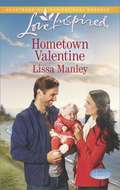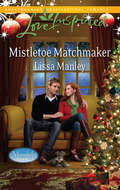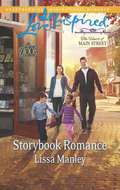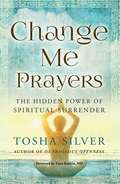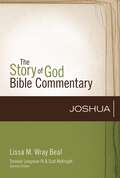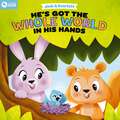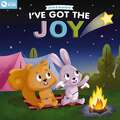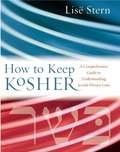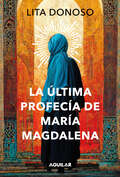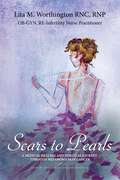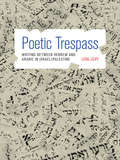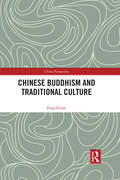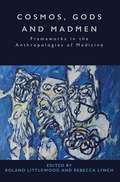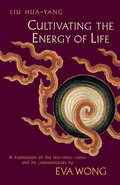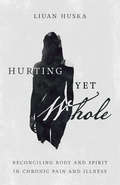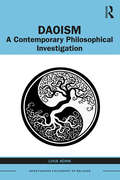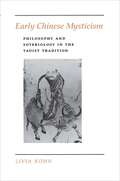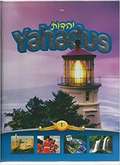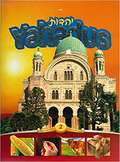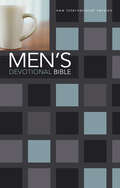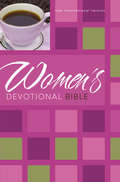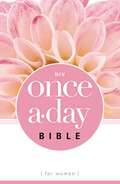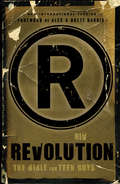- Table View
- List View
Hometown Valentine
by Lissa ManleyFinding Her Family Lily Rogers is ready to follow her dreams. Now all she needs is funds. Taking a job as baby Peyton's temporary nanny seems like an easy way to earn cash for her plane ticket to LA. But there's nothing easy about how Lily feels for Peyton's uncle, coffee shop owner Blake Stonely. As Valentine's Day approaches, Lily's head fills with romantic notions of the handsome new daddy. She's falling for a family that isn't hers, and dreaming of a life with the blue-eyed barista and his adorable niece. Will Lily leave Blake and Peyton behind...or make a new future-and family-with them by her side? Moonlight Cove: A beachside town where love and faith blossomLily Rogers is ready to follow her dreams. Now all she needs is funds. Taking a job as baby Peyton's temporary nanny seems like an easy way to earn cash for her plane ticket to LA. But there's nothing easy about how Lily feels for Peyton's uncle, coffee shop owner Blake Stonely. As Valentine's Day approaches, Lily's head fills with romantic notions of the handsome new daddy. She's falling for a family that isn't hers, and dreaming of a life with the blue-eyed barista and his adorable niece. Will Lily leave Blake and Peyton behind...or make a new future-and family-with them by her side? Moonlight Cove: A beachside town where love and faith blossom
Mistletoe Matchmaker
by Lissa ManleyPet store owner Molly Kent can't help smiling when Grant Roderick chases his aunt's poodle into her shop. Grant, who's pet-sitting, doesn't know much about dogs and welcomes Molly's offer of help. Little does Grant know that Molly's also a matchmaker-not that he's looking for love. Yet the more time they spend together, the more Molly wonders if Grant may be her perfect match. But how can she get involved with a workaholic after being raised by one? They'll both have to put their trust in God if they want to find happiness for the holidays.
Small-Town Homecoming
by Lissa ManleyA Home to Cherish Ten years ago, Curt Graham left his hometown in disgrace. Now Curt returns to Moonlight Cove for a fresh start and to reestablish family ties. The pretty owner of the inn where he's staying is exactly the kind of woman he needs. But Jenna Flaherty is waiting for the perfect man. Curt knows he'll never be that. When the little boy Jenna babysits needs Curt's help, he's surprised to discover he's a good father figure-and that he harbors a wish to have a home of his own. Now if only he could convince Jenna he'd make her a wonderful husband. Moonlight Cove: A beachside town where love and faith blossom.
Storybook Romance
by Lissa ManleyBoy Meets Girl...Again It's been more than ten years, but Allison True has never forgotten her high school crush, Sam Franklin. Back in Bygones, her only focus is keeping her new bookstore afloat-yet the single dad of twin toddlers is testing her resolve to be career minded. Getting involved with a man who vowed never to love again is a recipe for disaster in Allison's book. But life with Sam and his twins could give her the happily ever after she's always dreamed of. The Heart of Main Street: They're rebuilding the town one step-and heart-at a time
Change Me Prayers: The Hidden Power of Spiritual Surrender
by Tosha Silver Lissa RankinFrom the author of the life-changing book Outrageous Openness: Letting the Divine Take the Lead, a thoughtful collection of prayers and stories to help you actively invite the Divine into your life."Change me Divine Beloved into One who can give and receive freely and be a clear vessel for Your Light." In this sequel to her first book, Tosha Silver, with her characteristic mix of passion and humor, shows how to embrace transformation from the inside out. Covering a variety of topics--from work and finances to love and self-worth--Change Me Prayers shows how to truly surrender to a Divine plan in the most joyous and uplifting way. At its heart, this book is a spiritual guide to help anyone open to this union with Love, even in times of difficulty or crisis, and includes a convenient "Change Me Prayers Quick Guide." Tosha proves to be a profound, unique, and often hilarious guide to awakening. May the Divine permeate every part of your life!roves to be a profound, unique, and often hilarious guide to awakening. May the Divine permeate every part of your life!
Joshua (The Story of God Bible Commentary)
by Lissa Wray BealA new commentary for today's world, The Story of God Bible Commentary explains and illuminates each passage of Scripture in light of the Bible's grand story.The first commentary series to do so, SGBC offers a clear and compelling exposition of biblical texts, guiding everyday readers in how to creatively and faithfully live out the Bible in their own contexts. Its story-centric approach is ideal for pastors, students, Sunday school teachers, and laypeople alike.Each volume employs three main, easy-to-use sections designed to help readers live out God's story:LISTEN to the Story: Includes complete NIV text with references to other texts at work in each passage, encouraging the reader to hear it within the Bible's grand story.EXPLAIN the Story: Explores and illuminates each text as embedded in its canonical and historical setting.LIVE the Story: Reflects on how each text can be lived today and includes contemporary stories and illustrations to aid preachers, teachers, and students. —Joshua—The book of Joshua continues the story of Genesis to Deuteronomy, bringing Israel into the land promised Abraham in Genesis 12. Joshua's emphasis on God&’s gift of the land, the conduct of warfare and the treatment of Canaan's inhabitants, and the importance of obedience to the law of Moses all arise out of this long narrative.Edited by Scot McKnight and Tremper Longman III, and written by a number of top-notch theologians, The Story of God Bible Commentary series will bring relevant, balanced, and clear-minded theological insight to any biblical education or ministry.
Jack and Scarlett: He's Got the Whole World in His Hands (Jack and Scarlett)
by Listener KidsFeaturing fun, cute, and oh-so-fluffy Listener Kids stars Jack and Scarlett, He's Got the Whole World in His Hands, an interactive board book for littles, is the perfect way to get kids thinking critically and engaged in this simple story about God's love and protection. He's Got the Whole World in His Hands is an interactive board book for kids featuring YouTube's Listener Kids stars Jack and Scarlett. Through interactive prompts, scripture, and a classic church song, toddlers and preschoolers are invited to join Jack the squirrel and Scarlett the bunny as they face their fears during a thunderstorm and learn to trust in the Lord.Jack and Scarlett: He's Got the Whole World in His Hands is perfect foractive toddlers and preschoolers who will love participating in the story,fans of the YouTube channel Listener Kids, praise music, or classic children's songs, andparents who are teaching their kids how to trust in the Lord.Listener Kids is a provider of Christ-centered music and videos--and now books!--that are perfect for kids. Their modern versions of classic Sunday school and Bible songs not only get kids singing and dancing but also instill values that Christian parents appreciate. Join in the fun and sing your worries away with Jack and Scarlett!
Jack and Scarlett: I've Got the Joy (Jack and Scarlett)
by Listener KidsFeaturing fun, cute, and oh-so-fluffy Listener Kids stars Jack and Scarlett,?I've Got the Joy, an interactive board book for littles, is the perfect way to get kids thinking critically and engaged in this simple story about joy.I've Got the Joy is an interactive board book for kids featuring YouTube's Listener Kids stars Jack and Scarlett. Through interactive prompts, scripture, and a classic kid's church song, little readers are invited to tag along as Jack and Scarlett have the time of their lives while camping and experience true joy. Jack and Scarlett: I've Got the Joy?is perfect foractive toddlers and preschoolers who will love participating in the story,fans of the YouTube channel Listener Kids, praise music, or classic children's songs, andteaching kids what it means to have joyful hearts.Listener Kids is a provider of Christ-centered music and videos—and now books!—that are perfect for kids. Their modern versions of classic Sunday school and Bible songs not only get kids singing and dancing but also instill values that Christian parents appreciate. Join in the fun, and jump, sing, and dance for joy with Jack and Scarlett!
How to Keep Kosher: A Comprehensive Guide to Understanding Jewish Dietary Laws
by Lisë SternA Comprehensive Guide to Understanding Jewish Dietary Laws
La última profecía de María Magdalena
by Lita DonosoQuién es en verdad este personaje. En la actualidad existe un intenso resurgir de María Magdalena en la literatura, el cine, la televisión, a través de quienes dicen canalizar sus mensajes o, simplemente en el deseo de, cada vez más personas, por saber más de ella, siguiendo un llamado a conocerla mejor Lita Donoso, psicóloga y creadora de Alkymia ha realizado una extensa investigación, ha entrevistado a múltiples personajes ha viajado por América, Europa y Medio Oriente y ha buscado descifrar su misterio. ¿Quién fue ella en verdad? ¿La mujer que nos presenta en Nuevo Testamento o aquella que a través de los evangélicos apócrifos se nos revela como la pareja de Jesús? ¿Fue acaso la apóstol de apóstoles y depositaria del legado de Cristo o también la madre de sus hijos y de una descendencia que se extendió por toda Europa? Dice la autora: "He comprobado que existe una amplia gama de miradas respecto a ella: la mirada histórica, la religiosa, la mística, la del activismo feminista, etc. Pero la que desaparece es la de la prostituta a la que Jesús le sacó siete demonios. La mirada que les traigo de María Magdalena es la de la iniciada en el conocimiento de la Ciencia Espiritual. Así se me presentó y así sigo recibiéndola".
Scars to Pearls: A Medical Healing and Spiritual Journey Through the Phases of Malignant Melanoma Stage IIIA Skin Cancer with Micro-Metastasis.
by Lita M. WorthingtonSo when facing a life threatening trial, how do you refuel the transformation needed to replenish the balance in life itself? What do you lean on, trust on, or hope on? I am a recently retired OB-GYN-Infertility nurse practitioner of almost thirty years in the field, and I experienced delivering a spectrum of diagnoses in my area of expertise. There were the ‘good news’ moments with joy, success, and cure. But there will be moments we witness overwhelming pain and the devastating news of death. The shoe is on the other foot now for me. I am the patient with metastatic melanoma skin cancer and not the provider, a very uncomfortable and humbling place for me. <P><P> Sometimes the biggest battle fought isn’t the cancer, but the emotional battle we suddenly find ourselves in. We are not prepared for this emotional turmoil or how to deal with it. The journey I experienced and now share with you had its difficulties, filled with approximately fifty appointments, two surgeries, hospitalization and therapies, but life continues. If you have recently been diagnosed with cancer, I know you are scared; I certainly was. Because in the beginning when you first hear the news, you immediately wonder: ‘How is this all going to end?’ The journey has only just begun and we are already wondering: ‘How it’s all going to play out?’ I know all the questions you are asking yourself, for I am the patient now and my perspective has changed. I can feel the uncertainty of your courage and strength to proceed through the demands of appointments, diagnostic testing, surgeries, pain, and treatments. I know the tears you will wipe quietly away from your cheek in the middle of the night when you can’t sleep or when you are simply all alone, afraid, in pain, or discouraged. I can feel your heart pounding so loud that certainly anyone standing next to you must hear it also. Your mind is spinning with worry from all the ‘what ifs.’ What will help me ‘succeed’ at alleviating the fear that is ever present and now sprinkled into my daily life?As a lifelong believer in Christ, a foundation of faith was laid long ago. I was just a believer, as some years were more inclusive of Christ Jesus than others. But I never doubted there was a God. I would learn how to respect, love and nurture this new found relationship in the months ahead. I chose to lean on, trust on, and hope on my faith and I began introducing a spiritual element into my new daily routine. In the months of pain and challenges, reaching for spiritual encouragement and journaling as the days, weeks, and months would pass, I found myself in a relationship with my Creator. <P>He sat with me, walked with me and became my companion when I was alone and tired. Experiencing the joy with this new relationship was a gift to me, from God. But, of course, the medical provider in me led me to bring an educational element to my book. It is not the number one cancer killer, but it is the universally number one diagnosed cancer. I had recognized the lack of awareness amongst my friends and family, in regards to skin cancers and the serious threat they pose. So I include many Medical Pearls, which may be facts, or a helpful hint to pay additional attention to. For those who want to read about an amazing spiritual journey I include several Holy Spirit Moments which could be visions or occurrences in which only God could provide and explain. And, I share Spiritual Pearls which are my spiritual thoughts on scripture, visions or dreams that occurred both past and present, as it contributes to who I am. In my most vulnerable moments, my trust needed to lie somewhere other than myself. I am very good at taking care of myself, thank you very much. Suddenly my life takes a turn, and I better get ready for the unchartered course it will take. One day at a time. We all have a story within us. This shall be my story.
Poetic Trespass
by Lital LevyA Palestinian-Israeli poet declares a new state whose language, "Homelandic," is a combination of Arabic and Hebrew. A Jewish-Israeli author imagines a "language plague" that infects young Hebrew speakers with old world accents, and sends the narrator in search of his Arabic heritage. In Poetic Trespass, Lital Levy brings together such startling visions to offer the first in-depth study of the relationship between Hebrew and Arabic in the literature and culture of Israel/Palestine. More than that, she presents a captivating portrait of the literary imagination's power to transgress political boundaries and transform ideas about language and belonging. Blending history and literature, Poetic Trespass traces the interwoven life of Arabic and Hebrew in Israel/Palestine from the turn of the twentieth century to the present, exposing the two languages' intimate entanglements in contemporary works of prose, poetry, film, and visual art by both Palestinian and Jewish citizens of Israel. In a context where intense political and social pressures work to identify Jews with Hebrew and Palestinians with Arabic, Levy finds writers who have boldly crossed over this divide to create literature in the language of their "other," as well as writers who bring the two languages into dialogue to rewrite them from within. Exploring such acts of poetic trespass, Levy introduces new readings of canonical and lesser-known authors, including Emile Habiby, Hayyim Nahman Bialik, Anton Shammas, Saul Tchernichowsky, Samir Naqqash, Ronit Matalon, Salman Masalha, A. B. Yehoshua, and Almog Behar. By revealing uncommon visions of what it means to write in Arabic and Hebrew, Poetic Trespass will change the way we understand literature and culture in the shadow of the Israeli-Palestinian conflict.Some images inside the book are unavailable due to digital copyright restrictions.
Chinese Buddhism and Traditional Culture (China Perspectives)
by Litian FangSince the first century, when Buddhism entered China, the foreign religion has influenced and been influenced in turn by traditional Chinese culture, and eventually became an important part of it. That is one of the great historical themes not only for China but also for East Asia. This book explores the elements of Buddhism, including its classics, doctrines, system, and rituals, to reveal the basic connotation of Buddhism as a cultural entity. Regarding the development of Buddhism in China, it traces the spread in chronological order, from the introduction in Han Dynasties (202 BC–220 AD), to the prosperity in the Sixteen Kingdoms (ca. 304–439 AD), and then to the decline since the Five Dynasties (907–ca. 960 AD). It is noteworthy that the Buddhist schools in the Southern and Northern Dynasties (420–589 AD) and the Buddhist sects in Sui and Tang Dynasties (581–907 AD) contributed to the sinicization of Buddhism. This book also deals with the interesting question of the similarities and differences between Chinese Buddhism and Indian Buddhism, to examine the specific characters of the former in terms of thought and culture. In the last chapter, the external influence of Chinese Buddhism in East Asia is studied. Scholars and students in Buddhism and Chinese culture studies, especially those in Buddhist countries, will benefit from the book. Also, it will appeal to readers interested in religion, Chinese culture, and ancient Chinese history.
Cosmos, Gods and Madmen: Frameworks in the Anthropologies of Medicine
by Lynch LittlewoodThe social anthropology of sickness and health has always been concerned with religious cosmologies: how societies make sense of such issues as prediction and control of misfortune and fate; the malevolence of others; the benevolence (or otherwise) of the mystical world; local understanding and explanations of the natural and ultra-human worlds. This volume presents differing categorizations and conflicts that occur as people seek to make sense of suffering and their experiences. Cosmologies, whether incorporating the divine or as purely secular, lead us to interpret human action and the human constitution, its ills and its healing and, in particular, ways which determine and limit our very possibilities.
Cultivating the Energy of Life
by Liu Hua-YangHere is the Hui-ming Ching, a classic Taoist manual on the circulation of internal energy by means of meditation and the inspiration for many techniques of Qigong. It is one of the few Taoist treatises to describe the landmarks of spiritual development and document the process of spiritual transformation from start to finish.
Hurting Yet Whole: Reconciling Body and Spirit in Chronic Pain and Illness
by Liuan HuskaWhat if the things we most fear about our bodies—our vulnerability to illness and pain—are exactly the places where God meets us most fully? As Liuan Huska went through years of chronic pain, she wondered why God seemed absent and questioned some of the common assumptions about healing. What do we do when our bodies don't work the way they should? What is healing, when one has a chronic illness? Can we still be whole when our bodies suffer? The Christian story speaks to our experiences of pain and illness. In the embodiment of Jesus' life, we see an embrace of the body and all of the discomfort and sufferings of being human. Countering a Gnosticism that pits body against spirit, Huska takes us on a journey of exploring how healing is not an escape from the limits of the body, but becoming whole as souls in bodies and bodies with souls. As chronic pain forces us to pay attention to our bodies' vulnerability, we come to embrace the fullness of our broken yet beautiful bodies. She helps us redefine what it means to find healing and wholeness even in the midst of ongoing pain.
Daoism: A Contemporary Philosophical Investigation (Investigating Philosophy of Religion)
by Livia KohnDaoism: A Contemporary Philosophical Investigation explores philosophy of religion from a Daoist perspective. Philosophy of religion is a thriving field today, increasingly expanding from its traditional theistic, Christian roots into more cosmologically oriented Asian religions. This book raises a number of different issues on the three levels of cosmos, individual, and society, and addresses key questions like: What are the distinctive characteristics of Daoist thought and cosmology? How does it approach problems of creation, body, mind, and society? What, ultimately, is Dao? How does it manifest and play a role in the world? What are the key features of Daoist communities and ethics? What role does the body play in Daoism? What do Daoists think is the relationship between language and reality? What is Daoist immortality? How do Daoists envision the perfect life on earth? The volume delves into philosophical subject matter in a way that is accessible to those approaching the topic for this first time, while also making an original contribution to Daoist philosophy of religion. This volume is suitable for use by undergraduate and graduate students studying Chinese religion and philosophy, as well as more general introductory courses on Daoism.
Early Chinese Mysticism: Philosophy and Soteriology in the Taoist Tradition
by Livia KohnDid Chinese mysticism vanish after its first appearance in ancient Taoist philosophy, to surface only after a thousand years had passed, when the Chinese had adapted Buddhism to their own culture? This first integrated survey of the mystical dimension of Taoism disputes the commonly accepted idea of such a hiatus. Covering the period from the Daode jing to the end of the Tang, Livia Kohn reveals an often misunderstood Chinese mystical tradition that continued through the ages. Influenced by but ultimately independent of Buddhism, it took forms more various than the quietistic withdrawal of Laozi or the sudden enlightenment of the Chan Buddhists. On the basis of a new theoretical evaluation of mysticism, this study analyzes the relationship between philosophical and religious Taoism and between Buddhism and the native Chinese tradition. Kohn shows how the quietistic and socially oriented Daode jing was combined with the ecstatic and individualistic mysticism of the Zhuangzi, with immortality beliefs and practices, and with Buddhist insight meditation, mind analysis, and doctrines of karma and retribution. She goes on to demonstrate that Chinese mysticism, a complex synthesis by the late Six Dynasties, reached its zenith in the Tang, laying the foundations for later developments in the Song traditions of Inner Alchemy, Chan Buddhism, and Neo-Confucianism.
Yahadus Curriculum Book 1
by Living LessonsMadah and Ahavah Living Lessons' flagship Yahadus curriculum gives a strong overview of the entire Torah over five years (fourth through eighth grade) with the mitzvos as a framework. <P><P> Each year, students learn approximately 120 Mitzvos, and the curriculum adjusts in content, language and design to suit the target age level. <P><P> The Rambam's order of the mitzvos, organized by subject, has been used, with rare exceptions. This logical sequence makes it much easier for children to connect to and retain the information. <P><P> The curriculum starts in fourth grade with the mitzvos of Sefer Madda, and ends with Sefer Shoftim in eighth grade. There is one student textbook for each year. Four volumes are now available, with the fifth and final volume coming soon b'ezras Hashem. The textbooks are sturdy and designed to last for a number of years by the students in each grade. <P><P> A two-part Teacher s Guide, as well as a workbook with activities is available for the students to use. <P><P> While every school is constantly challenged to squeeze in everything they want to teach into their limited time resources - as they should be - this curriculum is a tremendous asset, as it can change the approach of the teachers and students to the entire learning process. <P><P> The curriculum also covers many aspects of any Jewish Studies curriculum, being that it goes through all 613 mitzvos, and thus may free up some of the time needed for them. <P><P> It is designed to use approximately 90 minutes per week. <P><P> The curriculum is built with much flexibility in the time it will use: <P><P> It can be taught either in varying timeframes (1 - 2 longer sessions per week, or 3 - 4 shorter ones.) <P><P> Much of the information is optional and the layout is designed to allow it to easily be included or omitted in classroom instruction based on time allowances. <P><P> It reads easily and is visually attractive enough for students to take home and prepare varying amounts of the text before class. <P><P> Living Lessons is a grass-roots effort to create high-quality Torah learning materials for children. Benefiting from the latest educational methods, and without compromising our rich Mesorah, a group of dedicated individuals have undertaken the monumental task of preparing materials to make Torah engaging, meaningful and exciting to learn and teach. <P><P> The first result of the this effort is the state-of-the-art Yahadus curriculum, designed by a team of Mechanchim and Mechanchos, Rabbonim, researchers, writers, designers, parents, and children. Other exciting projects are underway. Stay tuned for updates!
Yahadus Curriculum Book 2
by Living LessonsZemanim, Noshimm Kedushah, and Hafloah <P><P>Living Lessons' flagship Yahadus curriculum gives a strong overview of the entire Torah over five years (fourth through eighth grade) with the mitzvos as a framework. <P><P> <P><P>Each year, students learn approximately 120 Mitzvos, and the curriculum adjusts in content, language and design to suit the target age level. The Rambam's order of the mitzvos, organized by subject, has been used, with rare exceptions. This logical sequence makes it much easier for children to connect to and retain the information. The curriculum starts in fourth grade with the mitzvos of Sefer Madda, and ends with Sefer Shoftim in eighth grade. There is one student textbook for each year. Four volumes are now available, with the fifth and final volume coming soon b'ezras Hashem. The textbooks are sturdy and designed to last for a number of years by the students in each grade. A two-part Teacher s Guide, as well as a workbook with activities is available for the students to use. While every school is constantly challenged to squeeze in everything they want to teach into their limited time resources - as they should be - this curriculum is a tremendous asset, as it can change the approach of the teachers and students to the entire learning process. The curriculum also covers many aspects of any Jewish Studies curriculum, being that it goes through all 613 mitzvos, and thus may free up some of the time needed for them. <P><P>It is designed to use approximately 90 minutes per week. The curriculum is built with much flexibility in the time it will use: It can be taught either in varying timeframes (1 - 2 longer sessions per week, or 3 - 4 shorter ones.) Much of the information is optional and the layout is designed to allow it to easily be included or omitted in classroom instruction based on time allowances. It reads easily and is visually attractive enough for students to take home and prepare varying amounts of the text before class. <P><P>Living Lessons is a grass-roots effort to create high-quality Torah learning materials for children. Benefiting from the latest educational methods, and without compromising our rich Mesorah, a group of dedicated individuals have undertaken the monumental task of preparing materials to make Torah engaging, meaningful and exciting to learn and teach. The first result of the this effort is the state-of-the-art Yahadus curriculum, designed by a team of Mechanchim and Mechanchos, Rabbonim, researchers, writers, designers, parents, and children. Other exciting projects are underway. Stay tuned for updates!
Yahadus Student's Textbook 5
by Living LessonsKinyan, Mishpatim and Shoftim Living Lessons’ flagship Yahadus curriculum gives a strong overview of the entire Torah over five years (fourth through eighth grade) with the mitzvos as a framework. Each year, students learn approximately 120 Mitzvos, and the curriculum adjusts in content, language and design to suit the target age level. The Rambam’s order of the mitzvos, organized by subject, has been used, with rare exceptions. This logical sequence makes it much easier for children to connect to and retain the information. The curriculum starts in fourth grade with the mitzvos of Sefer Madda, and ends with Sefer Shoftim in eighth grade. There is one student textbook for each year. All five volumes are now available. The textbooks are sturdy and designed to last for a number of years by the students in each grade. A two-part Teacher s Guide, as well as a workbook with activities is available for the students to use. While every school is constantly challenged to squeeze in everything they want to teach into their limited time resources - as they should be - this curriculum is a tremendous asset, as it can change the approach of the teachers and students to the entire learning process. The curriculum also covers many aspects of any Jewish Studies curriculum, being that it goes through all 613 mitzvos, and thus may free up some of the time needed for them. It is designed to use approximately 90 minutes per week. The curriculum is built with much flexibility in the time it will use: It can be taught either in varying timeframes (1 - 2 longer sessions per week, or 3 - 4 shorter ones.) Much of the information is optional and the layout is designed to allow it to easily be included or omitted in classroom instruction based on time allowances. It reads easily and is visually attractive enough for students to take home and prepare varying amounts of the text before class. Living Lessons is a grass-roots effort to create high-quality Torah learning materials for children. Benefiting from the latest educational methods, and without compromising our rich Mesorah, a group of dedicated individuals have undertaken the monumental task of preparing materials to make Torah engaging, meaningful and exciting to learn and teach. The first result of the this effort is the state-of-the-art Yahadus curriculum, designed by a team of Mechanchim and Mechanchos, Rabbonim, researchers, writers, designers, parents, and children. Other exciting projects are underway. Stay tuned for updates!
NIV Men's Devotional Bible
by Livingstone CorporationThe NIV Men’s Devotional Bible helps you apply God’s Word to your everyday life. The standard in men’s devotional Bibles, it includes a full year of devotions along with application statements, questions for reflections, and more. Some of the contributors in this Bible aren’t names you’ll recognize. They’re ordinary men with extraordinary insights into the Scriptures. Others are well-known contemporary and classic communicators. Either way, these 312 weekday and weekend devotions are engaging, practical, and useful for your life today.Features: • Complete text of the NIV—the most popular modern-English Bible • A full year of weekday and weekend devotions, along with application statements, questions for reflection, and more • Devotions written by a gifted author team also feature insights by writers such as Chuck Colson, Lee Strobel, Rick Warren, and Ravi Zacharias • Multiple reading plans for year-after-year use • Introductions for each book of the Bible • Author index with biographical information on each contributor • Subject index to help you locate topics easily
NIV Women's Devotional Bible
by Livingstone CorporationThe standard in women’s devotional Bibles, the NIV Women’s Devotional Bible helps you apply God’s Word to your everyday life. This Bible includes a full year of devotions written by women of God, who had a woman like you in mind. This group of women writers offers inspiration, candid perspectives, and guidance from the Bible. During the week, there are guided reflections to help you apply Scripture to your daily life. On the weekends, you will have the chance to get to know the women of the Bible on a more personal level. After a year is up, there are reading plans that will lead you into the next year! Features: • Complete text of the NIV—the most popular modern-English Bible• A full year of weekday and weekend devotions with questions for reflection, additional Scripture readings, and more• Devotions written by women of God, including Elisabeth Elliot, Lenya Heitzig, Carol Kent, Ann Graham Lotz, Kathi Macias, and Thelma Wells• Introductions for each book of the Bible • Multiple reading plans for year-after-year use • Author index with biographical information on each contributor • Subject index to help you locate topics easily
NIV, Once-A-Day: Bible for Women, eBook (Once-A-Day)
by Livingstone CorporationWith this NIV Once-A-Day Bible for Women, you can read through the Bible in a year. . . or at your own pace. Now you can practice the spiritual discipline of daily Bible reading at your own pace. Want a reading plan that will take you through the Bible in a year? You got it. Don’t want the guilt of falling behind in your daily reading? You won’t—each daily reading is numbered, not dated, allowing the flexibility you need as you strive to engage God’s Word every day. Looking for a Bible with insights about what you as a woman most need to hear? These are included as well in the intuitive, hopeful devotional thoughts located at the end of each daily reading. The NIV Once-A-Day Bible for Women organizes the clear, accessible New International Version Bible into 365 daily readings. Each day’s reading includes a portion of Scripture from the Old Testament, the New Testament, and a Psalm or a Proverb, followed by an encouraging devotional thought specifically written for women.
NIV, Revolution: The Bible for Teen Guys, eBook
by Livingstone CorporationRevolution is for every guy who wants to live a revolutionary life.The NIV Revolution Bible ebook equips you to be a revolutionary—living your faith on the edge, challenging things that need to be challenged, discovering new possibilities, and helping others to discover them as well. Like no other Bible ebook you have ever read, NIV Revolution is for today’s teen guy living in a messy world. God knows all about this world—he is the authority when it comes to understanding relationships, communication, sex, parents, popularity, peer pressure, drugs, divorce, and everything else teenagers face. He also knows what makes you tick, loves you more than you can ever imagine, and wants you to experience a life of purpose, responsibility, and impact. <P><P>A revolution of the heart isn’t about how confident, strong, or popular you are. It’s about what God can do in you and through you. He can revolutionize your relationships, your opportunities, and the whole course of your life. He can use you to change the world around you. Are you ready to find out how? Then look inside, and let the revolution begin.This Bible ebook strengthens you and hones your spiritual revolutionary edge: "Battlelines" show you how other teen guys deal with relationships, sex, drug abuse, and other real-life issues; "Match-Ups" pit the good guys against the bad guys of the Bible to uncover winning—and losing—approaches to life; "Live the Revolution" notes show you how to change your life and revolutionize your impact on others. And there’s plenty more—enough to help you make a kingdom-difference in the world around you. Fill your hands with Revolution. It will open your eyes, strengthen your courage, and guide you like a compass toward a life worth living.
